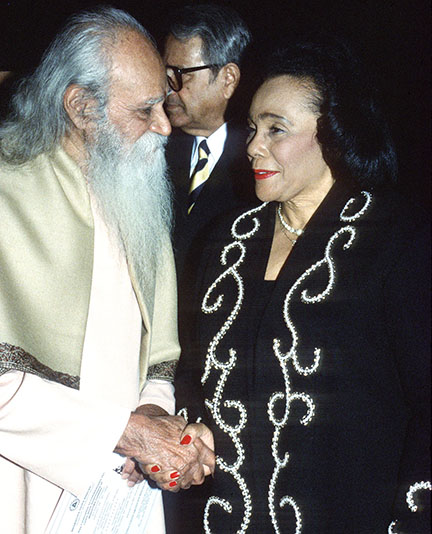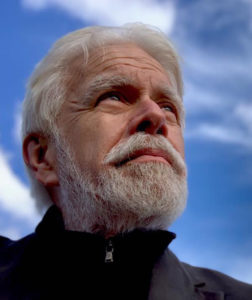
[Photo: Journalist Jeff Kamen (front far left) and Dr. King (far right) during a civil rights march, 1960s.]
Martin Luther King, Jr. was the son of privilege in the most enlightened city of the segregated south. His father was the pastor of a large church in Atlanta attended by many affluent people. Young Martin could have stayed right there in Atlanta living a life of prestige comfort and safety but spirit called him into the rising storm of historic change. In 1955, Dr. King began what would be a thirteen year campaign to dismantle racial segregation all across America.
Dr. King was only 26 years old when he moved to Montgomery, Alabama to preside over what would become the historic Montgomery bus boycott to end racial discrimination in public transportation. It was also the first major nonviolent action by African-Americans. Led by Dr. King, 50,000 people refused to ride unless they had access to all seating not just the back of the bus.
It was during the year-long bus boycott that Dr. King first declared his connection to the ancient yogic principle of nonviolence known as ahimsa. Dr. King said, “Christ gave us the goals (for this movement) and Mahatma Gandhi (gave us) the tactics.” News media photos of black people being brave, dignified, and nonviolent during the bus boycott offered the world a powerfully positive image of America’s most oppressed racial minority.
I was 12 years old when Dr. King was leading the bus boycott. Dr. King and I first met almost 10 year later when I was 21 and a radio reporter based in New York. At that time I knew little about the yogic principle of nonviolence. But I’ll never forget the impression Dr. King made on me when we spoke in New York City following his return from Sweden after receiving the Nobel Peace Prize. I did not realize it at the time, but it was Dr. King’s powerful connection to Spirit that touched me deeply. I did not know that my own gradual inner transformation was underway because of Dr. King. I had no idea that one year later I would begin a journalistic and spiritual journey that would change my life.
Dr. King lived live his life as a person of insight, compassion, and public courage. Witnessing his authenticity opened my heart to spirit and gave me clarity about the power of love in a time of fear and hate. Inevitably, being around Dr. King meant a lot of time in churches as he organized African Americans to take to the streets with love and dignity and determination. He didn’t always like my reporting especially about his frustrations. Still, he seemed to think I was okay.
Dr. King had a subtle sense of humor and he once joked that my intensive coverage of his organizing efforts inside many black churches had made me, as he said “the most churched Jewish boy in America,” and Dr. King said, with understatement, that my time inside the black church had not done me any harm. That was absolutely true.
When Dr. King heard that I had been attacked by the Klan while reporting on a night march his staff had organized in Grenada, Mississippi, he called me and said, “I’m glad you’re alright. I hope you’ll continue your reporting on life here in the South.”
Through his speeches and dramatic demonstrations, Dr. King brought the attention of the world to every aspect of racism in America. That put him at risk. I was at his side in Chicago when a he was hit in the head by a rock thrown by a high school student who did not want black people to live in his neighborhood. I was with Dr. King in the middle of this riot when he learned that even though he won the Nobel Peace Prize, he could not stop the madness of violence once it began. I was with him this night in Canton, Mississippi when he and hundreds of others—nonviolent women and men black and white—were beaten by State Police for participating in the March Against Fear.
Despite the suffering inflicted on him and on those he led, King was generally optimistic loving and calm. But on this day, Dr. King was deeply worried. He had just been told by his closest advisor that some locals were preparing for violent confrontation. It was 1966 and we were in Philadelphia, Mississippi. This march was in honor of three brave young volunteer civil rights workers killed there two years earlier in what the FBI called the Mississippi Burning case. Their names were Michael Schwerner, Andrew Goodman, and James Chaney. They had come to support local black people as they registered to vote. If black people voted, they could install public officials who would respect them—unlike this local Deputy Sheriff, Cecil Price. He was one of the seven men ultimately convicted in the murders of the three civil rights workers. On the day of the commemorative march led by Dr. King, this same deputy was still on the job. I remember him walking up to Dr. King and attempting to intimidate him before Dr. King led the marchers in prayer. A year later, Deputy Sheriff Price was in federal prison.
Until Dr. King was assassinated in Memphis in 1968, he continued to preach nonviolence and love for all people. Dr. King and Integral Yoga® founder, Sri Swami Satchidananda, who I interviewed in 1973, shared the same loving philosophy that says all people of every color truly are brothers and sisters.
It was Mahatma Gandhi who was the first great advocate of the political application of the ancient yogic principle of ahimsa. Dr. King never met Gandhiji but his Boston University graduate school professor Howard Thurman did. And that meeting would help change Dr. King and the world.
Martin Luther King Jr. was a mystic, with a powerful sense of his direct connection to Jesus and the will of God. When you listen to him you really get it. His speech to the March on Washington is widely considered one of the greatest orations in modern history.
Dr. King’s legacy continued through the dedicated work of his widow, Mrs. Coretta Scott King, and their children. Established in 1968 by Mrs. King, The Martin Luther King, Jr. Center for Nonviolent Social Change (“The King Center”) has been a global destination, resource center, and community institution for over a quarter century. The King family has spoken all over the globe about the importance of teachings and legacy of Dr. King.

(Photo: Swami Satchidananda and Mrs. King during 125th birth anniversary program of Mahatma Gandhi, New York, 1994.)
An occasion in October 1994 highlights the intersection of luminaries who have championed the spirit of ahimsa. October 2, 1994 was the 125th anniversary of Mahatma Gandhi’s birth. The Bharatiya Vidya Bhavan (the Institute of Indian Culture) held a special celebration in New York to commemorate the occasion. The program featured a panel discussion on Mahatma Gandhi’s life and message and particularly his dedication to ahimsa. Speakers included Mrs. Coretta Scott King, Sri R. Venkataraman (former President of India), Indian Ambassador Siddhartha Shankar Ray, Indian Consul General Gajanan Wakankar, Sri S. Ramakrishna (general secretary of the Bhavan and former secretary to Mahatma Gandhi), Robert Goheen (chairman of the Bhavan and former US Ambassador to India and my own teacher, Sri Swami Satchidananda.
Following the panel, the Bhavan presented Sri Swamiji with their highest honor for his life of service dedicated to the principles that Mahatma Gandhi promoted. This is a rare honor and given to very few including H. H. the Dalai Lama, Prince Charles, Jawaharlal Nehru, and Mother Teresa, among several others.
A photo from this occasion of Mrs. King and my teacher, Sri Swami Satchidananda, is a beautiful meeting of east and west—though Kipling predicted the twain would never meet—and celebration of the spirit of ahimsa, which lives on through the legacies and inspiration of Mahatma Gandhi, Martin Luther King, Jr., and Sri Swami Satchidananda.
About the Author:

Award-winning journalist Jeff Kamen is the author of Warrior Pups: True Stories of America’s K9 Heroes and co-author with Robert Kupperman of Final Warning: Averting Disaster in the New Age of Terrorism. His New York Daily News Magazine cover story, “Facing the Terrorists,” provided readers with extraordinary access to the NYPD’s storied Bomb Squad. His news reporting and documentaries on national security, law enforcement, race relations, and politics have been featured on radio TV and in print for more than forty years. Kamen has reported for NPR, NBC News, ABC and CBS Radio, CBC and Mutual News. Jeff’s documentary, “Outside the Wire,” for the Air Force won the top prize for Pentagon-produced films in 2005. Watch Kamen’s 1973 documentary, “Yoga for the City,” featuring Sri Swami Satchidananda here.

